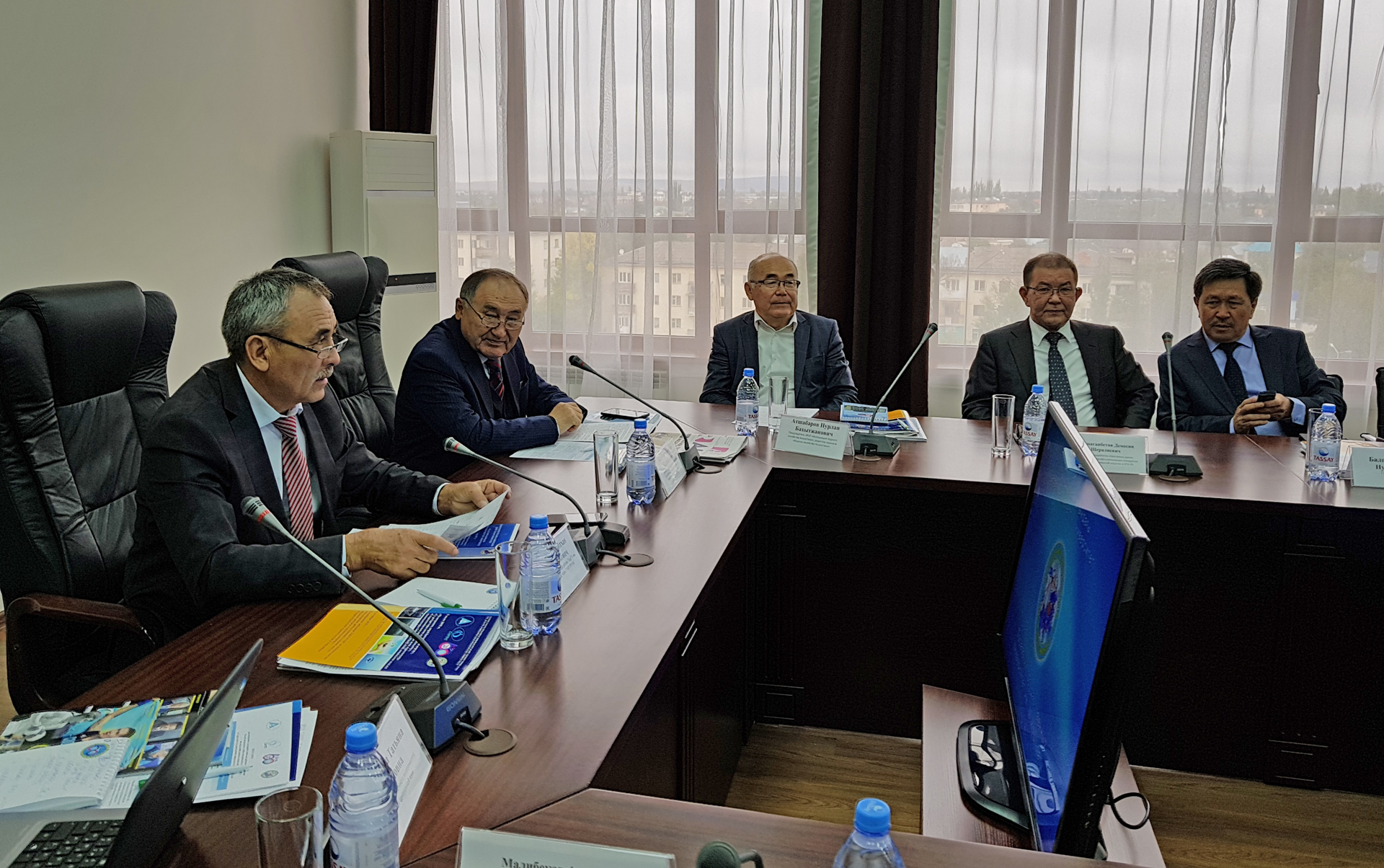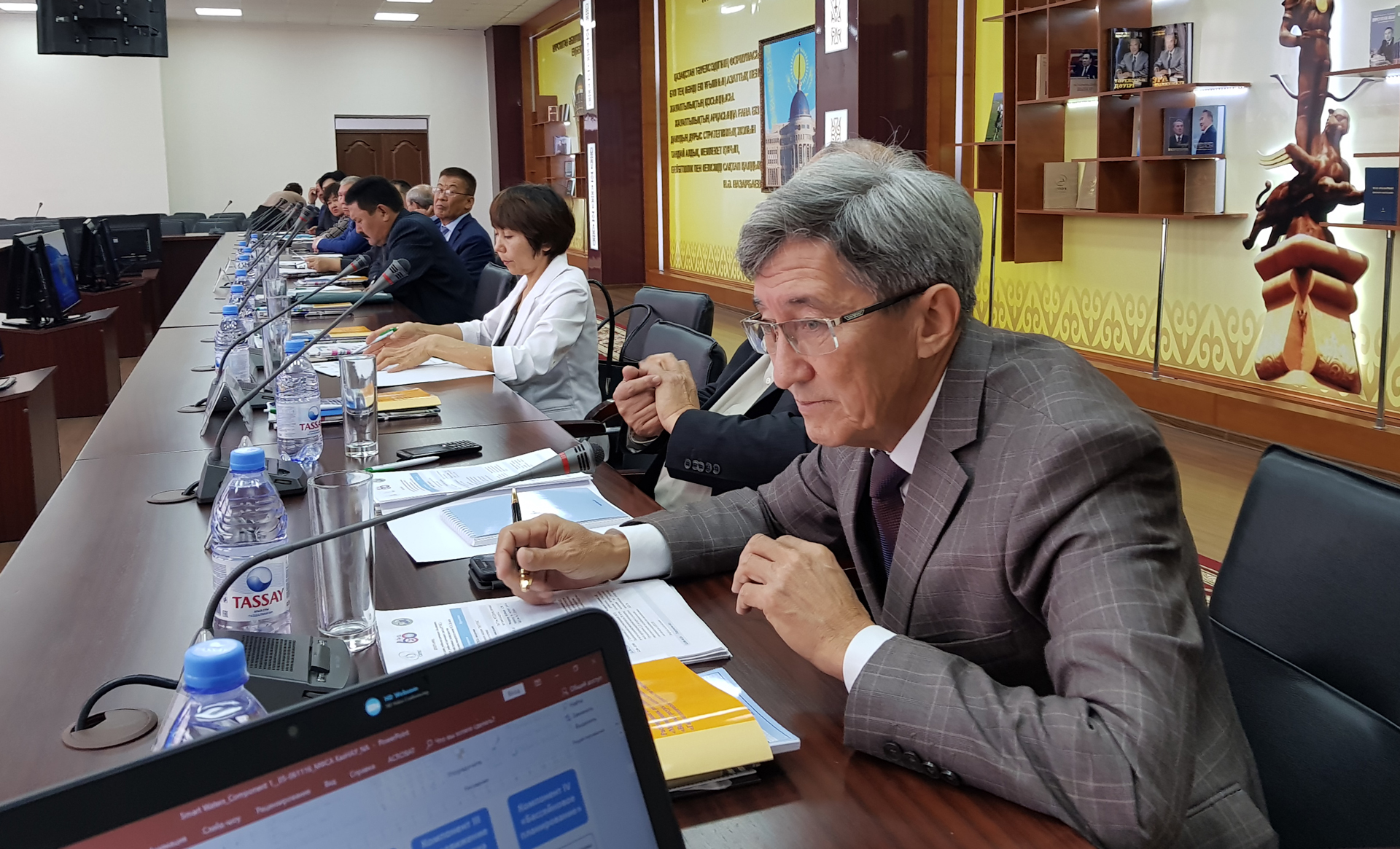
TARAZ. On October 8, 2018, an extended meeting of the Republican Educational and Methodological Council (REMC) on water specialties was held at the Taraz State University (TarSU) named after M. Kh. Dulati. The event was organized by the Executive Board of the International Fund for Saving the Aral Sea (IFAS EB) in Kazakhstan with the support of the CAREC-USAID “Smart Waters” project.
The event coincided with celebrations dedicated to the 60th Anniversary of TarSU. Many of the well-known water experts of Kazakhstan and Central Asia are the graduates of this university. In the past, the Taraz Hydromelioration Institute trained strong hydraulic engineers, and today in Kazakhstan there is a shortage of engineers and specialists, particularly hydraulic engineers, land reclamation specialists and specialists in the rural water supply. This is largely due to the fact that the education system does not always meet the challenges and real needs of water supply structures.
The revival of this education and training system is a key to restoring irrigated lands, which, in turn, is directly related to food security and water supply in rural settlements. Considering this interrelation and realizing the importance of reviving the system of education and training specialists for the country's water sector, in 2017 the IFAS EB with partners established the “Complex of agro-industrial associations” consortium, which supports the process of harmonization of vocational education standards (VES), including those in the water sector.
On July 4, 2018, at the briefing of the Minister of Labor and Social Protection of the Population of Kazakhstan, Madina Abylkasymova noted that “…the formation of the national qualifications system will continue. Within the framework of it, professional standards are being developed, ... on the basis of these standards, educational programs in the technical and vocational education (TVE) system and in the higher education system will be updated”. There will be developed a national system for forecasting staffing needs with the purpose to understand what kind of specialists, in what quantity country will need in the labor market in 5-10 years. Moreover, the forecasting will be carried out not only by areas of activity but at the level of specific competencies and skills. Ms Abdulkasymova also said that this year a new Classifier of occupations was introduced. In addition, together with large enterprises in the country that are implementing elements of the Industry 4.0, roadmaps are being developed on a managed retraining system for labor resources.

It is worth stating that the meeting in Taraz was organized as a part of the project to analyze the needs of the Kazakhstan market for modern specialists, harmonization of professional standards and state education standards (SES) of water industry specialists in the specialty “Water resources and water use”. During the meeting, the parties reviewed the progress in the project implementation, namely in the following issues:
1. Provision of the water sector of the Republic of Kazakhstan with appropriate specialists: problems and status of the issue.
2. Organization of work on the formation of the National Qualifications Framework (NQF) in terms of the water sector of Kazakhstan.
3. Improving the training of water professionals in the light of updating the regulatory legal acts (normative legal acts) in the field of education (making changes and additions to the Law of the Republic of Kazakhstan "On Education", State Educational Standard of Bachelor, Master and Doctoral Studies, Classification of specialties of higher and postgraduate education learning).
4. Plans for the development of the sectoral qualifications framework (SQF) and the necessary professional standards for the water sector, as well as the further promotion of work on the synchronization of elements of the NQF (SQF, professional standards PS).
At the meeting it was noted by Amirkhan Kenshimov, representative of the IFAS EB in Kazakhstan and the Consortium of the Complex of Agro-Industrial Associations: “In early October, meetings of the Aral-Syrdarya large and small basin councils (BC) took place, which made a number of requests to us. Since the Water Resources Committee (CWR) is located at the Ministry of Agriculture (MoA) of the Republic of Kazakhstan, in their staff list the management mainly consists of veterinarians, economists, historians, but there are very few water specialists. At the same time, in many irrigation systems, water users do not receive enough water supply, and something needs to be done about it. There is a shortage of hydro engineers and water engineers at the local level. Water is sorely lacking, there is not enough water accounting and rational use of water resources. It is planned to increase irrigated lands, but the irrigation technologies are not modern enough - sprinkling, drip irrigation, etc., there are not enough engineers and technical specialists - water technical specialists, an engineering base is needed, therefore this project is a very important one for local communities. These are the wishes of the local water users in the Republic of Kazakhstan. We should try to help them in meeting these needs together with CAREC and USAID”.
Along with the participants, the meeting was attended by the IFAS Publishing House in Kazakhstan, representatives of state bodies - the Water Resources Committee, CAREC, TarSU and other universities of Kazakhstan who train water specialties.
Very substantive presentations were made by the project experts and devoted to the issues of organization of work on the formation of the NQFs and the improvement of the training of water specialists in the light of the updating of the SQF.
A special place on the agenda was taken by the experts’ discussions on:
• The next steps in the development of NQF and professional standards for the water industry and plans,
• Further progress in the synchronization of elements of the NQF (SQF, professional standards),
• Specific proposals on the needs of universities and the possibility of introducing new educational programs for successfully passing the test of professional standards of NCE “Atameken” and approval by the Ministry of Education and Science of the Republic of Kazakhstan,
• Sustainability of this process and the results achieved, as well as the responsibility and ownership of national partners for further support and promotion of the results in practice and in the educational system.
Since professional standards establish the relationship between employers and educational organizations within the NQF, it is extremely important for experts to ensure the transition from the labor market to the market of qualifications and competencies, and to establish a link between the labor market and qualifications.
Summarizing the meeting results, the participants decided to prepare a set of proposals to the Ministry of Education and Science of Kazakhstan. Experts concluded that it is necessary to abolish the specialty “Water resources and water use” and instead – introduce into the Classifier of specialties of higher and postgraduate education of the Republic of Kazakhstan – a group of specialties classified as “Water Industry”. It will be necessary to introduce the following specific specialties into this group: Hydraulic structures and construction; Water supply, Water disposal and protection of water resources; Hydrotechnical reclamation; Land Hydrology; Hydrogeology and Engineering geology; Water management and Safety of hydraulic structures.
The participants of the meeting also noted that in order to consider the specifics of the water resources use in the sectors of the country's economy, especially in irrigated agriculture, it is important to introduce the specialization at universities that train personnel for water management. In other words, each higher education institution should train specialists in a specific aspect of the water management, based on the water infrastructure available in each of the regions.
